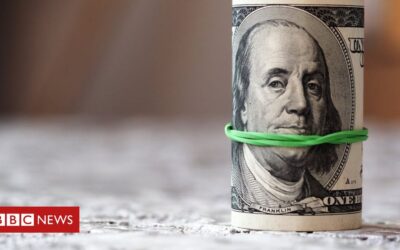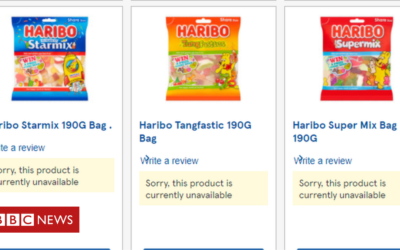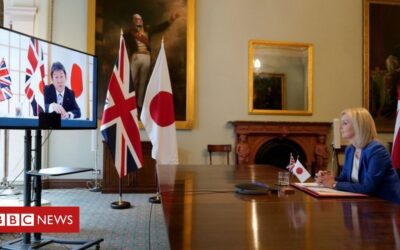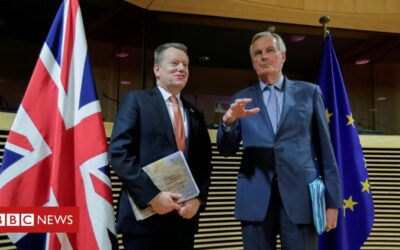A delicious smell of homemade pies wafts through the Thomas Egerton pub in Bolton.A strange sensation given the pub is resoundingly closed, the tables stacked with chairs.Brand new takeaway boxes piled onto a central table explain why.Publican Josh Lee is trying to make the best of a bad situation.After just two months of “heaven”, being open after the national lockdown, he had to shut his doors as all hospitality venues in the Bolton area were closed this week.He has re-furloughed his staff, keeping just himself and the head chef Robert Nelson in their small kitchen.He’s hoping the new takeaway menu and this two-man band can keep the pub ticking over. “It can’t get any worse can it?” he laughs ruefully. He believes this pub will probably survive, but its sister pub round the corner will not.The new local lockdown restrictions mean most of the pubs and restaurants in the centre of Bolton are closed.The Elephant and Castle is a lone venue selling beer from a trestle table outside its front door, and there is a Greek restaurant with plastic screens in the entrance looking hopefully for takeaway customers.Many told us that the High Street was depressed before the coronavirus hit. The new restrictions have just made it worse. “Going out should be utopian”It’s these sorts of closures that businesses in other parts of the UK fear.”This is a classic example of people trying to get round the rules.” Jimmy Pratt, the manager of the Next Level bar in Halifax, waves a booking form at me.”Chloe – she reserved for six – now she wants to add another two tables of four. We can do it, sure, but we’ll have to split them up into different areas around the bar”. Here in West Yorkshire, restrictions have been in place since the end of July.They stop people socialising from different households inside homes and public venues such as bars and restaurants.The same sorts of restrictions that have just been introduced in Birmingham.This has turned bar managers like Jimmy into “tyrants”, as he puts it. He is very aware that if they don’t conform rigidly to the guidelines, Halifax could be the next Bolton. At the same time, he’s trying to keep the bar fun. “It’s hard to feel like you’re breathing down people’s necks. They want to enjoy the fact that they can get out of the house. When you come to a bar you’re coming to a utopia where you’re escaping the mundanity of everyday life.”He says the number of people coming into the bar is dropping as a result, which he puts down to fear and confusion about the rules.Local restrictions have been imposed on a sliding scale and, unsurprisingly, those areas subject to stricter measures have seen businesses suffer the most.The hospitality and retail sectors have been hit in particular as people feel less confident about going out. It’s a Catch-22 situation, trying to get the economy going again and encouraging people back into the workplace, while trying to prevent any spike in infection that could make local lockdowns more widespread and more stringent.Valentin Quinio, a researcher at the Centre for Cities think tank, has analysed the impact on footfall and spending of local lockdowns.”When, like in Greater Manchester, they’re designed to prevent households mixing, the impact on city centre footfall is only slight. But when, like in Aberdeen, they shut shops, then we can see this in the figures.” She says this will lead to job losses in the short to medium-term “as long as people stay at home then the situation for local businesses and services in locked-down centres is very difficult”.Shane Taylor, research and policy manager at the Aberdeen & Grampian Chamber of Commerce says: “At least one business in our membership closed permanently off the back of the local lockdown. We are concerned that further spikes and local restrictions may be the straw that breaks the camel’s back for many.” Ripple effect There’s a ripple effect of local lockdowns on surrounding areas.Leicester went into a second lockdown at the end of June, the first place to do so.Dog-grooming business The Dog House is based just outside the restricted area.Owners Anna Pollard and Selina West found they lost appointments when the restrictions were at their height, because people weren’t travelling from inside the zone.There is also a lingering effect on consumer confidence, according to Yael Selfin, chief economist at KPMG. “Even in Leicester when restrictions were lifted, footfall is 20% lower than we would have expected,” she says.Overall it is difficult to quantify the overall impact of the local lockdowns for the UK economy.”In term of the share of the economy, locked down areas represent just over 8%, so it’s not a major part, but they will have broader implications in terms of confidence and overall consumer spending and business investment in the UK,” she says.Extra support The government has allocated funding for those businesses affected by the restrictions. Businesses in England that are required to shut because of local lockdowns can claim up to £1,500 per property every three weeks while small businesses will get £1,000. Businesses still locked down at a national level are not eligible.But the director general of the British Chambers of Commerce, Adam Marshall, would like to see more.”Companies have people on their payroll, they have rent, they have suppliers to pay and the grants aren’t going to be enough to pay the bills when you don’t have any takings,” he says. However, Mr Lee in Bolton feels he has received a lot of support, and says that the challenge it has made him more entrepreneurial.”It reminds me a bit of the introduction of the smoking ban. We’ve got to adapt and change what we do,” he says.
BBC Business News Articles
US budget deficit soars to $3tn record
The US budget deficit has hit a record high of more than $3tn (£2.3tn), driven by the government’s massive spending on coronavirus relief.The federal government spent more than $6tn in the first 11 months of its financial year, including $2tn on coronavirus programmes, the Treasury Department said.The figure outpaces the $3tn it took in from taxes.The shortfall is more than double the previous full-year record, set in 2009.At the time, Washington was grappling with the aftermath of the 2008 housing financial crisis.Even before the pandemic, the US was on track to run a deficit of more than $1tn this year – large by historic standards.But the spending approved to try to cushion the financial impact of the virus has exploded those projections.The Congressional Budget Office this month predicted that the US was likely to run a full-year deficit of $3.3tn, more than triple the shortfall recorded last year. The federal government’s financial year ends in September.The agency said it expected total US debt to exceed $26tn.’Unsustainable’At a hearing in Washington in June, Jerome Powell, the head of the US central bank, told members of Congress that America’s spending path was “unsustainable”, but said reducing the shortfall should not be a priority given the state of the economy.The economy shrank at an annual rate of more than 30% in the April-June period, its worst quarterly contraction on record. Data suggest job layoffs and business closures are continuing.Roughly 30 million people – about 20% of the American workforce – remain on some form of unemployment benefits, despite reopening underway, the Labour Department said this week.Many conservatives in Washington, however, remain leery of further spending. Republicans this week put forward a $300bn proposal for more aid. The plan failed to advance, with Democrats saying it fell far short of the more than $3tn in relief they support.
Turkey farmers 'on tenterhooks' over Christmas demand
Some turkey farmers are concerned there may be an over-supply of birds this Christmas with social gatherings potentially much smaller than usual. With UK coronavirus infections rising at present, potential restrictions on meeting up are unclear.But thousands more turkey chicks, known as “poults”, are being reared for Christmas meals.And some producers are betting on travel restrictions keeping more people at home over the festive period.One south Wales farm, which normally rears 70,000 turkeys a year, told Radio 4’s Farming Today it has already cut its numbers by 20%.Nick Davis from Usk Vale Poultry is concerned the birds will be too big for the numbers at the dinner table. The turkeys were ordered in the spring when the outlook for a “normal” Christmas seemed clearer.He said: “In May, when we canvassed our main core of customers, who are retail butchers, they were having a boom time.”[They] were saying nothing is going to change, because everything’s buoyant, and we want the same numbers as last year. But that was easy for them to say.””We have to decide what size people want and you can’t even tell me today what size that might be.”He said the farm has “a bit of flexibility”. “We can play around with rations a bit, and we can process [slaughter them] a week or 10 days earlier, so we can reduce the size to a certain extent, but not by massive percentages”.Socialising restrictionsNew rules from Monday mean people will be banned from meeting more than six people socially indoors or outdoors.It is not yet clear how long the new “rule of six” will be in place, although Health Secretary Matt Hancock told Radio 4’s Today programme he hoped it would be lifted before Christmas. Similar rules are being introduced in Scotland and Wales.According to data from the Department for Environment, Food and Rural Affairs (Defra), the number of turkey chicks being reared in the first six months of 2020 increased compared to the same period last year.Between January and June 2020, there were 6.2 million poults on farms, compared to 6.1 million in the same period in 2019.Despite worries by some farmers about an over-supply of turkey, some producers are more optimistic, believing more families will be at home this Christmas should travel restrictions remain in place.Neil Cooksey, commercial director for Bernard Matthews, said that could be good news for turkey producers, with in-home consumption of the meat expected to increase. “The eating out-of-home occasion and holiday market is going to be much smaller, and our view is they will convert into retail sales. People want turkey on their plates at Christmas and that’s never going to change.”Do I see purchases and orders going up this year? Yes I do,” he said.However smaller producers remain nervous about demand for the larger birds they are rearing. Mr Davis said “The run up to Christmas is not a fun time for a turkey farmer at the best of times, but this year we really are on tenterhooks.”It’s going to be a lucky turkey producer that gets this Christmas right, rather than a clever one”.
Lululemon lampooned for 'resist capitalism' post
Lululemon, known for its £128 yoga leggings, is facing mockery on social media for promoting an event about “decolonising gender” and how to “resist capitalism”. The event was featured in an Instagram post in which Lululemon recommended other accounts to follow, including the host of the workshop, Rebby Kern.The yoga instructor is a US-based brand ambassador for the firm.Lululemon distanced itself after the irony of the message drew attention.”We recently shared on our social channels an upcoming event organised by one of our ambassadors.”This is not a Lululemon forum and it does not represent the company’s views,” a spokeswoman told the BBC.She said the firm was removing the post.Lululemon shares have rallied more than 35% this year after signs the pandemic has reignited demand for so-called athleisure-wear.But the ridicule gained legs on social media after the conservative Woke Capital Twitter account, which frequently lampoons corporate marketing efforts, spotlighted the seemingly awkward pose from the company, which is worth more than $40bn. Other conservative pundits and journalists soon chimed in.Amy Swearer, a legal fellow at the Heritage Foundation think tank, noted: “Lululemon IS capitalism. It is literally a privately owned corporation that raked in half a billion dollars in pure profits last year, merely by selling overpriced yoga pants to women willing and able to pay for this luxury”.Twitter users from across the political spectrum criticised the stance.Randi Max, who identifies as a liberal on her Twitter account, wrote: “OMG. I’m tired of the hypocrisy. Lululemon’s yoga pants cost $150 and you are telling me to resist capitalism?” Lululemon, which turned skin-tight black leggings into a fashion statement, has weathered controversy before.In 2019 the company investigated claims that workers at a factory in Bangladesh making its clothing had been beaten and abused, according to the Guardian. Earlier this year, it also apologised after one of its employees posted a T-shirt design on social media that caused outrage in China.The firm said the design, of a takeaway food carton with “bat wings”, was seen as a racist reference to coronavirus, was not one of its products and the employee had been dismissed.
Haribo stocks run low at Tesco over price cut row
Tesco is allowing stocks of Haribo sweets to dwindle from its shelves following a row with the confectioner over price cuts.The Grocer reports that the supermarket giant is demanding suppliers lower prices to allow it to compete with German discounter Aldi.Haribo and Tesco have failed to reach a deal and ranges such as Tangfastics and Starmix are unavailable online.Tesco said it continues to stock Haribo products online and in store.”We hope to have the full range available again for customers soon,” said a spokesman for the supermarket chain.In March, Tesco launched its “Aldi Price Match” campaign, to match the prices on hundreds of its goods with the German discounter.It subsequently asked suppliers to cut their prices as part of a strategy to take Aldi. Companies were told they had until 10 July to agree.A spokeswoman for Haribo said: “We are aware of some out of stock products, but can confirm that Haribo has not been delisted by Tesco. “No comment can be made with regards to any commercial discussions with our customers other than that our conversations continue.”While many sectors have struggled during the coronavirus pandemic, supermarkets have thrived after customers initially panic-bought produce and demand for online grocery deliveries surged.Tesco’s most recent results, for the 13 weeks to the end of May, show that like for like sales in the UK and Ireland rose by 8.2%.UK online sales jumped by 48.5% after particularly strong growth in May. It has led to Tesco creating 16,000 permanent roles to support its fast-growing internet business.Haribo is one of the word’s best-known sweet makers whose products are sold in 100 countries and employs 7,000 people.Haribo was founded in Germany 100 years ago by confectioner Hans Riegel, who was born in Bonn – the brand’s name comes from a combination of Hans Riegel and Bonn.The inventor of the “Gummi” bear died in 1945 towards the end of the Second World War. The business was passed to his sons Hans and Paul after they were released as prisoners of war by US forces.
UK signs first major post-Brexit trade deal with Japan
The UK has struck its first major post-Brexit trade pact after signing a deal with Japan that aims to boost trade between the countries by about £15bn.International Trade Secretary Liz Truss said it was a “historic moment”.She said it would bring “new wins” for British businesses in manufacturing, food and drink, and tech industries.Critics said while the deal may be of symbolic importance it would boost UK GDP by only 0.07%, a fraction of the trade that could be lost with the EU.Friday’s deal still needs approval by Japan’s parliament, which the country’s Foreign Minister Toshimitsu Motegi forecast would be passed by January.How many trade deals has the UK done?Ms Truss said the UK-Japan Comprehensive Economic Partnership Agreement means 99% of exports to Japan will be tariff-free.”The agreement we have negotiated – in record time and in challenging circumstances – goes far beyond the existing EU deal, as it secures new wins for British businesses in our great manufacturing, food and drink, and tech industries,” she said.”From our automotive workers in Wales to our shoemakers in the North of England, this deal will help build back better as we create new opportunities for people throughout the whole of the UK and help level up our country.”She added that, strategically, the deal was an important step towards joining the Trans-Pacific Partnership and placing Britain at the centre of a network of free trade agreements.Major Japanese investors in the UK such as Nissan and Hitachi would benefit from reduced tariffs on parts coming from Japan and streamlined regulatory procedures, the UK’s trade department statement said.Prime Minister Boris Johnson has said Brexit gives Britain the freedom to strike trade deals with other countries around the world.Business leaders welcomed the agreement, but stressed that securing a deal with the EU remained the most important goal.The director general of the British Chambers of Commerce, Adam Marshall, called the announcement a milestone, but added: “Whilst this agreement is undoubtedly cause for celebration, securing a Free Trade Agreement with the EU remains critical to the future of businesses in the UK. “We urge ministers to redouble their efforts to reach a comprehensive partnership with our largest trading partner at a crucial time in the negotiations.”The CBI also hailed the agreement, with director general Carolyn Fairbairn saying this “breakthrough moment” can be the first of many. “It’s a huge opportunity to secure new Japanese investment across a wider range of sectors and UK regions,” she said. A small stepYou can almost hear the sighs of relief echoing around Westminster and within the business community. After weeks of wrangling, the first deal of the Brexit era has been struck, which ensures that 99% of British goods can enter Japan without tariffs, or extra charges.But ultimately, this deal largely mirrors the agreement which already exists between the EU and Japan. And with trade with Japan accounting for just 2% of the UK’s total, the expected boost to GDP of 0.07% over the long term is a tiny fraction of what might be lost from leaving the EU.And there is good reason for Japan cooperating to ensure this deal was secured in record time. It stands to get the lions share, 80%, of the total estimated £15bn boost to trade for both countries. Even then, the talks haven’t been as speedy or straightforward as initially hoped – which may not bode well for negotiations elsewhere.About 99% of exports between the two nations will be tariff-free under the deal, with a particular focus on the food and drink, finance and tech sectors. Manufacturing parts coming from Japan will benefit from reduced tariffs, as will British pork, beef and salmon travelling in the opposite direction.Japan’s Foreign Minister Toshimitsu Motegi said: “It was a very tough negotiation, but we reached the agreement in principle in about three months, at an unusually fast pace.”While maintaining the high levels of access to the British market under the Japan-EU EPA, we improved our access to the British market on train cars and some auto parts.”
Brexit talks will resume despite UK rejecting EU ultimatum
Post-Brexit trade deal talks will continue, despite the UK rejecting the EU’s ultimatum to scrap plans to override the withdrawal agreement.The EU has threatened the UK government with legal action if it does not ditch its controversial Internal Market Bill by the end of the month.Angered Tory backbench MPs have launched a bid to amend the new law.Meanwhile, trade talk negotiators on both sides have acknowledged they are still clashing on “significant” issues.Boris Johnson’s proposed Internal Market Bill, which will be formally debated by MPs in the House of Commons for the first time on Monday, addresses the Northern Ireland Protocol – an element of the Brexit withdrawal agreement designed to prevent a hard border returning to the island of Ireland.The new law would give UK ministers powers to modify or “disapply” rules relating to the movement of goods that will come into force from 1 January, if the UK and EU are unable to strike a trade deal.The publication of the bill prompted emergency talks on Thursday, in which the EU said the planned changes must be scrapped or risk jeopardising the UK-EU trade talks.But the government defied the EU’s demand, insisting it would proceed as planned with the legislation it says is necessary to protect the integrity of the UK and the peace process in Northern Ireland. Time and trust are running outWhen it comes to Brexit, all negotiations are inter-linked: EU-UK trade talks, the process to implement their divorce deal, negotiations on fishing rights and Brussels’ deliberation on UK financial service.What happens in one area very much affects progress in the others. You cannot separate them entirely.Which is why this week, as the war of words and wills between Brussels and Downing Street raged over the government’s threat to throw a grenade at key parts of the divorce deal, everyone’s thoughts turned immediately to the trade talks between the two sides.Could they survive? In fact, they limp on. Despite bitter arguments over legislation and a huge list of outstanding issues still to be ironed out in bilateral trade talks; despite time and trust running out on both sides; neither the EU nor the UK seem to want to be the first ones to walk out the door.Read more here.The latest round of trade talks also took place in London on Thursday, with both sides acknowledging that “significant” differences remain.Speaking afterwards, EU chief negotiator Michel Barnier said the EU had “shown flexibility” in an effort to “find solutions”, but the UK had not “not engaged” on some “major issues”.His UK counterpart David Frost said “challenging areas remain and the divergences on some are still significant”. He said UK negotiators “remain committed” to reaching a deal and officials would “continue discussions” next week. Mr Johnson has previously said he would walk away from the negotiating table if an agreement with the EU is not reached by 15 October.’Not natural rebels’The prime minister’s approach has sparked unease within the Conservative Party, with former leaders Theresa May, Lord Howard and Sir John Major among those urging the PM to think again. Former chancellor Lord Lamont said the government was in a “terrible mess” and warned that the Internal Market Bill would not get through the House of Lords in its present form.And even strong supporters of the government’s overall Brexit strategy and the Internal Market Bill have expressed concerns about how events could play out.Sir Bernard Jenkin – the leader of the strongly pro-Brexit European Research Group (ERG) – told LBC Radio that Mr Johnson “should be more mindful of the reputational damage of playing such hardball”.Leading Brexiteer and former ERG chairman Steve Baker told BBC Radio 4’s Today programme that the UK was “in a bad place” after a “series of very poor decisions”.He said a solution was “tantalisingly within our grasp” if a free trade agreement could be concluded but the UK should be prepared to “repudiate” the whole Withdrawal Agreement as the EU had acted in “bad faith”. Meanwhile, senior Conservative backbencher Sir Bob Neill, who chairs the Commons Justice Committee, is tabling an amendment to try to force a separate parliamentary vote on the three contentious clauses of the bill.Sir Bob said there needed to be a “parliamentary lock” on any changes to the withdrawal agreement. Among his supporters are Theresa May’s former deputy prime minister, Damian Green.”We are not natural rebels. We’ve all served as ministers, we know that this is a serious job, and we do our best to take the job seriously. So we don’t do anything like this lightly,” Sir Bob told Times Radio.”So I hope it’s at least an indication as a government that really, you need to think very hard and carefully about going down this route. For heaven’s sake, try and find some other way.”Gordon Brown has become the latest former prime minister to warn of the damage the move could do to the UK’s international reputation, telling Today it was a “huge act of self harm”.He added: “If I had done that when I was prime minister, the Conservatives would have accused me of breaching the rule of law and would have thrown everything at us.”
UK economy continues recovery in July
The UK economy grew by 6.6% in July, according to official figures, but output remains far below pre-pandemic levels.It is the third month in a row that the economy has expanded. But the Office for National Statistics (ONS), said that the UK “has still only recovered just over half of the lost output caused by the coronavirus”.Hairdressers, pubs and restaurants contributed to growth after companies were allowed to reopen in July.However, the UK’s economy is still 11.7% smaller than it was in February and growth in July was smaller than the 8.7% expansion seen in June.Thomas Pugh, UK economist at Capital Economics, said the reopening of restaurants and pubs meant the accommodation and food services sector “rose by a whopping 140.8%” between June and July.And while he expects the Eat Out to Help Out scheme to provide a further boost in August, “now that most sectors in the economy are open again there is little scope for further large rises in monthly GDP”.Up, up, but not away. The UK economy continued a sharp recovery from lockdown in July, growing by a bumper 6.6% in the month. But the rate of recovery was a little slower than in June, raising some concerns about the ongoing strength of the bounce back. The economy is still nearly 12% smaller than before the pandemic crisis, and has recovered just over half of the lost output during the shutdowns.While the third quarter is on course to see a record number for growth and the official end of recession, fears remain that the recovery could peter out. Business groups continue to push for extensions to government support packages that are due to close. The figures in July reflected the partial reopening of retail, manufacturing, and some public sector activities such as schools.The UK fell into recession after activity shrank for the first and second quarters of this year after the government announced a lockdown to stop the spread of the coronavirus.Mr Pugh questioned how strong the UK’s recovery would be throughout the rest of the year.”Talk of tax rises at the next Budget, a further deterioration in the Brexit negotiations and a worrying rise in the number of virus cases and tighter social distancing restrictions will all conspire to slow the recovery even further,” he said.
Rio Tinto chief Jean-Sébastien Jacques to quit over Aboriginal cave destruction
image copyrightGetty ImagesThe boss of Rio Tinto, Jean-Sébastien Jacques, will step down following criticism of the mining giant’s destruction of sacred Aboriginal sites.In May, the world’s biggest iron ore miner destroyed two ancient caves in Pilbara, Western Australia.The company went ahead with blowing up the Juukan Gorge rock shelters despite the opposition of Aboriginal traditional owners.It sparked widespread condemnation from shareholders and the public.Church of England attacks miner for Aboriginal blastsRio bosses lose bonuses over indigenous site destructionOn Friday, the company said in a statement: “Significant stakeholders have expressed concerns about executive accountability for the failings identified.”The board said Mr Jacques would remain as the chief executive until March or until a successor was appointed.Other senior executives, including the heads of the miner’s iron ore and corporate relations divisions, will also leave the company at the end of the year.The caves – seen as one of Australia’s most significant archaeological research sites – had shown evidence of continuous human habitation dating back 46,000 years.They sat above about eight million tonnes of high-grade iron ore, with an estimated value of £75m (A$132m; $96m).image copyrightAFPAustralia’s parliament is currently holding an inquiry into the miner’s actions.Rio Tinto also held its own inquiry earlier this year, after which the company cut bonuses for directors and began attempts at repairing relations with Aboriginal communities.”What happened at Juukan was wrong and we are determined to ensure that the destruction of a heritage site of such exceptional archaeological and cultural significance never occurs again at a Rio Tinto operation,” said chairman Simon Thompson.Artefacts found at the caves include a 28,000-year-old animal bone tool and a 4,000-year-old belt made of plaited human hair. DNA testing had directly linked it to the Puutu Kunti Kurrama and Pinikura (PKKP) people – the traditional owners of the land.After the caves were destroyed, a PKKP representative, John Ashburton, said losing the site was a “devastating blow”.”There are less than a handful of known Aboriginal sites in Australia that are as old as this one… Its importance cannot be underestimated,” he said.Last week it was revealed that in the days running up to the caves’ destruction in May, Rio Tinto hired lawyers in case opponents tried to seek injunctions to stop them.Although the company said it had permission for the work under Aboriginal heritage laws, critics said it suggested the miner was aware of the site’s cultural importance.In June, rival miner BHP also halted its plans to expand its mine in the Pilbara region in June following the outcry over Rio’s actions.Last month, Rio Tinto said it had cut Mr Jacques’ bonus by £2.7m. It also said Chris Salisbury, chief executive of iron ore, and Simone Niven, group executive of corporate relations, would lose more than half a million pounds each.But Tom Stevenson, investment director at Fidelity International, said Rio Tinto’s actions had been “slow and misguided”.”It was slow because when it knew the significance of those sites it could have reversed its position and it didn’t,” he said.”And it is misguided because when it cut bonuses recently it effectively put a price on something which is basically priceless and I think that that was tin-eared really. I’m not surprised that we’ve moved onto this stage where the chief executive felt that he had to go.”The cultural value of the Juukan Gorge shelters is huge and so is the loss. This decision to let the CEO go could be seen as a vindication after months of ongoing pressure from traditional landowners, other Aboriginal groups and shareholders who refused to stand for the destruction of one of Australia’s most important archaeological sites. The scandal also highlights the great imbalance of power between Australia’s influential mining industry and traditional landowners; and what the government’s responsibility should be to ensure the protection of historical and ancestral sites. Last month Mr Jacques and two senior executives were stripped of their multimillion-dollar bonuses for 2020. The move seemed to have backfired. Many saw cutting the pay of already very high-earning executives as showing a clear lack of touch, and nowhere near a satisfactory retribution for those responsible for overseeing community relations. Rio Tinto chairman Simon Thompson said that the mining giant was determined to regain the trust of the Puutu Kunti Kurrama and Pinikura people and other traditional owners. But given how they’ve handled this scandal, it’s hard to see that happening any time soon. Related TopicsMiningAustraliaRio TintoAustralian Aboriginal cultureWestern AustraliaMore on this story
Google and Twitter vow to block voting misinformation
Google and Twitter have said they are clamping down further on misinformation online ahead of the US elections.Messaging platforms expect a flood of false claims and misleading posts ahead of the November vote.Twitter said it plans to more aggressively label and remove election-related tweets that are inaccurate.Search engine Google said it would screen more auto-complete results to avoid voters being misled, particularly over reports claiming an early victory.Facebook and Twitter ‘dismantle Russian network’
China calls for inquiry after porn tweet ‘like’
One of the concerns is that the widespread use of mail ballots in the US election due to the coronavirus pandemic could cause significant delays in tallying results. Experts fear this could allow misinformation to gain traction.On Thursday, Google said that incorrect information about election results would not show up in searches.Twitter’s changes could also affect tweets claiming victory before election results have been certified, along with misleading posts about ballot tampering.Social media firms have been under pressure to combat misinformation after US intelligence agencies determined Russia used their platforms to meddle in the 2016 presidential election.”We will not permit our service to be abused around civic processes, most importantly elections,” Twitter wrote in its blog. “Any attempt to do so – both foreign and domestic – will be met with strict enforcement of our rules, which are applied equally and judiciously for everyone.”On Friday, Microsoft warned that hackers with ties to Russia, China and Iran were attempting to snoop on people and groups involved with the US 2020 presidential election.The US tech firm said the Russian hackers who breached the 2016 Democratic campaign were again involved.Russian networkLast week, Facebook said it had dismantled a small network of accounts and pages that were part of a Russian influence operation.The company said the campaign was linked to Russia’s Internet Research Agency (IRA), an organisation close to the Russian government and accused of interference in the 2016 US election.Twitter also suspended five accounts from the same network. The operation centred around PeaceData, which claimed to be a non-profit news website in English and Arabic.The messaging platform has clashed in recent months with President Donald Trump, who has posted frequently about potential fraud in the coming election while criticising Twitter for flagging his posts.Search resultsIn Google’s changes to auto-complete results, which predict what users are searching for, it will remove predictions “that could be interpreted as claims for or against any candidate or political party”.It will also remove the function that attempts to predict and complete search terms when people look up the status of voting locations, voting requirements or methods. Users will still be able to search for this information however.Last week, Facebook said it was creating a label for posts by candidates or campaigns that made premature claims of victory. It also said it would stop accepting new political ads in the week before Election Day.










